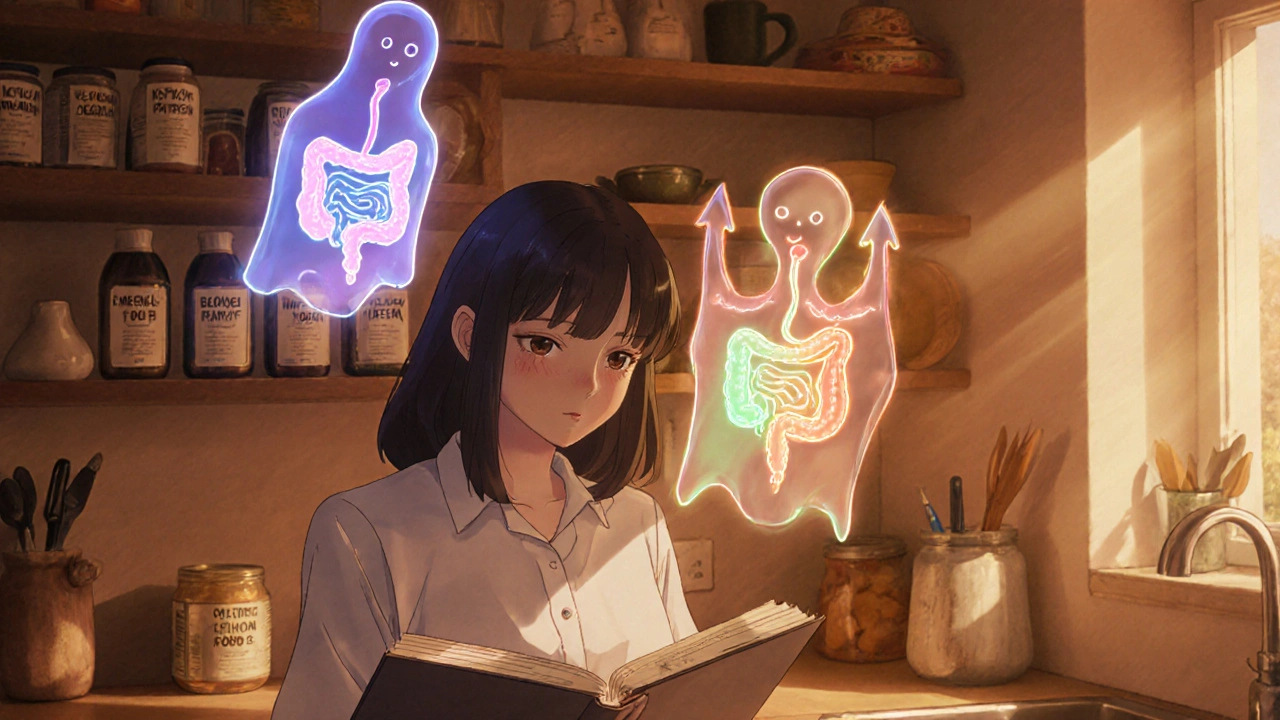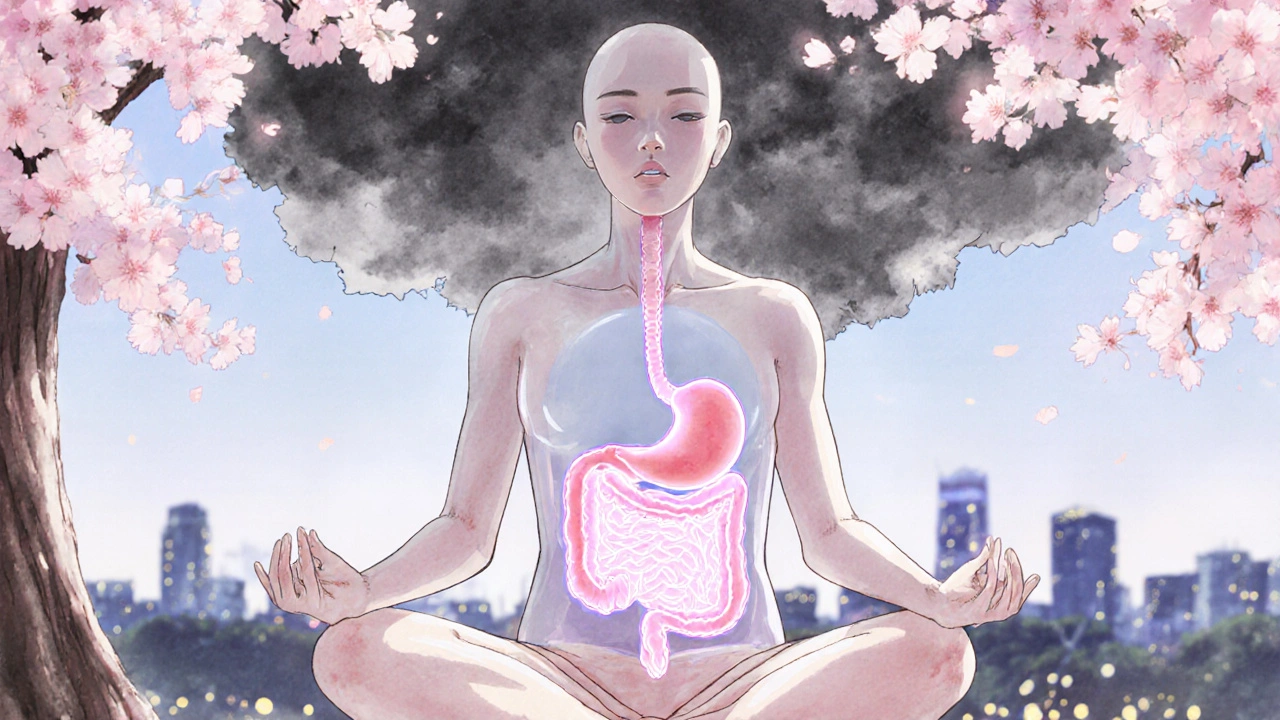If you’ve been dealing with constant bloating, cramps, or unpredictable bowel changes, you’re not alone. About 1 in 7 people worldwide live with irritable bowel syndrome, or IBS. It’s not something you can see on a scan or prove with a blood test-but it’s very real. And for many, it’s a daily battle that affects work, social life, and even sleep. The good news? You don’t have to just live with it. Understanding your symptoms, what sets them off, and what actually helps can turn things around.
What IBS Actually Feels Like
IBS isn’t just ‘a sensitive stomach.’ It’s a complex condition where the gut and brain miscommunicate. The pain isn’t random-it follows a pattern. Most people feel cramping or discomfort that gets worse after eating and improves after a bowel movement. Bloating is common too, often so bad that clothes feel tight, even if you haven’t eaten much.
There are three main types, based on your bowel habits:
- IBS-D (diarrhea-predominant): You might have sudden urges, watery stools, and feel like you can’t make it to the bathroom in time. About 40% of people with IBS fall into this group.
- IBS-C (constipation-predominant): You struggle to pass stool, feel like you haven’t fully emptied, and may strain for long periods. This affects roughly 35%.
- IBS-M (mixed): You switch between diarrhea and constipation, sometimes even in the same day. About 25% of people experience this pattern.
Other signs include mucus in stool, excessive gas, and a feeling of fullness after just a few bites. Some people also report nausea, acid reflux, or even chest pain that feels like a heart issue-but isn’t. These aren’t ‘in your head.’ They’re real physical reactions tied to how your gut functions.
What Makes IBS Flare Up
IBS doesn’t have one single trigger-it’s a mix. But certain things consistently make symptoms worse for most people.
Food is the biggest culprit. Around 70% of people with IBS notice their symptoms spike after eating certain foods. The biggest offenders? High-FODMAP foods. That’s a mouthful, but it just means foods that ferment easily in the gut: onions, garlic, wheat, dairy, apples, beans, and artificial sweeteners like sorbitol. You don’t have to cut them all forever. But knowing which ones hit you hardest can make a huge difference.
Stress is just as powerful. If you’ve ever felt butterflies before a big presentation-and then had to rush to the bathroom-you’ve seen the gut-brain connection in action. About 60 to 80% of people with IBS report worse symptoms during stressful times. It doesn’t matter if the stress is big (losing a job) or small (running late). Your gut reacts the same way.
Hormones play a role too. For women, symptoms often get worse right before or during their period. Around two-thirds of female IBS patients notice this pattern. It’s not ‘just PMS’-it’s the way estrogen and progesterone affect gut movement and sensitivity.
And yes, antibiotics can trigger it. About 1 in 4 people develop IBS after taking antibiotics, because those drugs upset the balance of good bacteria in the gut. Even a single course can be enough to set off long-term changes.
How Doctors Diagnose IBS
There’s no test for IBS. That’s why it often takes years to get diagnosed-on average, 6 years, according to patient reports. Doctors don’t guess. They rule things out.
The diagnosis follows the Rome IV criteria: you need abdominal pain at least once a week for 3 months, with two of these features: it improves after a bowel movement, it’s linked to a change in how often you go, or it’s tied to a change in stool appearance.
But before calling it IBS, your doctor will check for other conditions. They’ll likely order:
- A complete blood count to check for anemia or infection
- Celiac disease testing-because celiac mimics IBS
- Fecal calprotectin to rule out inflammatory bowel disease (like Crohn’s or ulcerative colitis)
- Hydrogen breath test if lactose intolerance or SIBO (small intestinal bacterial overgrowth) is suspected
- A colonoscopy if you’re over 45 or have warning signs like unexplained weight loss, rectal bleeding, or anemia
If all those tests come back normal and your symptoms match the pattern, you’ve got IBS. It’s a diagnosis of exclusion-but that doesn’t mean it’s not serious. It just means it’s functional, not structural.

Medications That Actually Work
There’s no one-size-fits-all pill for IBS. Treatment depends on your subtype and what bothers you most.
For IBS-D (diarrhea):
- Loperamide (Imodium) is available over the counter and helps slow bowel movements. About 60% of people find it useful for short-term relief, but it doesn’t fix the root cause.
- Rifaximin (Xifaxan) is an antibiotic that works only in the gut. It reduces bloating and diarrhea in about half of patients. It’s not for long-term use, but it can reset things after a flare.
- Eluxadoline (Viberzi) is a newer option that helps reduce both pain and diarrhea. About 40-50% of people see improvement, but it’s not safe for those with gallbladder issues or heavy alcohol use.
For IBS-C (constipation):
- Linaclotide (Linzess) increases fluid in the intestines, helping stool pass more easily. About 30-40% of people get at least three full bowel movements a week. Side effects? Diarrhea in about 1 in 3 users.
- Plecanatide (Trulance) works similarly and is often used if Linzess doesn’t work or causes too much diarrhea.
- Lubiprostone (Amitiza) pulls water into the gut and helps soften stool. Works for about 25-30% of people.
For pain and overall symptoms:
- Antispasmodics like dicyclomine (Bentyl) or hyoscine (Levsin) relax gut muscles. They help about 55% of people with cramping and pain.
- Low-dose antidepressants like amitriptyline (10-30 mg at night) are surprisingly effective-even if you’re not depressed. They change how the brain processes pain signals from the gut. Around 40-50% of people see improvement in pain, bloating, and bowel habits.
It takes time. Most medications show results in 2-4 weeks, but antidepressants can take up to 8 weeks to kick in. Don’t give up too soon.
What Works Beyond Pills
Medications help, but they’re not the whole story. The most successful IBS management plans combine multiple approaches.
The low-FODMAP diet is the gold standard for food-based relief. Done right-with help from a registered dietitian-it improves symptoms in 50-75% of people. It’s not about cutting out everything forever. It’s a 3-step process: eliminate high-FODMAP foods for 2-6 weeks, then slowly add them back one at a time to find your triggers. Most people learn their personal list within 3 months.
Therapy works better than you think. Gut-directed hypnotherapy and cognitive behavioral therapy (CBT) have been shown to reduce symptoms as well as medication. About 40-60% of people report major improvement after 6-12 sessions. It’s not about ‘thinking your way out of it.’ It’s about retraining how your brain responds to gut signals.
Probiotics can help-but only specific ones. Not all probiotics are equal. Only a few strains have solid proof: Bifidobacterium infantis 35624 (sold as Align) improved symptoms in 35% of people in clinical trials. Others? Not so much.
Stress management isn’t optional. Daily breathing exercises, yoga, or even 20 minutes of walking can lower symptom severity. It’s not a cure-but it’s a tool that costs nothing and has zero side effects.

What’s on the Horizon
Research is moving fast. In 2023, the FDA gave breakthrough status to a new drug called ibodutant, which targets nerve signals in the gut. Early results show 45% of users improved, compared to 22% on placebo. Fecal microbiota transplants (FMT)-where healthy gut bacteria are transferred from a donor-are also being tested. One 2022 study found 35% of IBS patients went into remission after FMT, versus just 15% in the control group.
But here’s the bottom line: even with all the new science, the best approach right now is still personalized care. What works for your friend might not work for you. That’s why tracking your symptoms, diet, and stress levels over time is so important. Keep a simple log: what you ate, how stressed you felt, and how your gut felt that day. Patterns will emerge.
Living Better With IBS
IBS doesn’t define you. But it does ask you to be smarter about your body. You don’t need to be perfect. You just need to be consistent.
Start small. Pick one thing: maybe it’s cutting out dairy for two weeks. Or trying a 10-minute breathing exercise every morning. Or writing down your meals in a notebook. Small steps add up.
And remember-you’re not broken. Your gut isn’t failing. It’s just sending mixed signals. With the right tools, you can quiet the noise and take back control.
Can IBS turn into Crohn’s disease or colon cancer?
No. IBS is a functional disorder, meaning the gut looks normal under a scope and doesn’t cause inflammation or tissue damage. It doesn’t lead to Crohn’s, ulcerative colitis, or colon cancer. But some symptoms overlap, which is why doctors rule out those conditions first-especially if you’re over 45 or have red flags like weight loss, bleeding, or anemia.
Is the low-FODMAP diet hard to follow?
It can be, especially at first. Many people struggle with the elimination phase because common foods like onions, garlic, wheat, and apples are off-limits. But it’s not meant to be permanent. After 2-6 weeks, you slowly reintroduce foods to find your personal triggers. Most people learn what they can tolerate within 3 months. Working with a dietitian makes it much easier-and increases your chances of success.
Why do I feel worse during my period?
Hormones like estrogen and progesterone affect gut movement and sensitivity. Many women with IBS notice more cramping, bloating, or diarrhea right before or during their period. This isn’t just ‘bad PMS’-it’s a real physiological link between your menstrual cycle and gut function. Tracking symptoms across your cycle can help you prepare and adjust your diet or stress management during that time.
Do probiotics help with IBS?
Some do, but most don’t. Only a few strains have been proven in clinical trials. Bifidobacterium infantis 35624 (found in Align) is the most studied and has shown consistent benefits, improving overall symptoms in about 35% of users. Other probiotics? The evidence is weak. Don’t waste money on generic brands-look for the specific strain that’s been tested.
How long does it take for IBS meds to work?
It varies. Loperamide or antispasmodics might help within hours or days. Medications like linaclotide or eluxadoline usually show results in 2-4 weeks. Low-dose antidepressants take longer-often 4 to 8 weeks at the right dose before you feel the full effect. Patience matters. Don’t stop too soon.
Can stress really cause IBS symptoms?
Yes. Stress doesn’t cause IBS, but it makes symptoms much worse. About 60-80% of people notice a direct link between stress levels and gut flare-ups. That’s because the gut and brain are wired together. When you’re anxious, your gut slows down or speeds up. Managing stress isn’t a luxury-it’s part of treatment. Even simple things like daily walks or breathing exercises can reduce pain and bloating over time.

